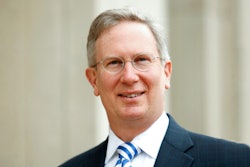 Dr. Rebecca Dolinsky
Dr. Rebecca DolinskyThe conference, titled The Quality of U.S. Degrees: Innovations, Efficiencies, and Disruptions — To What Ends?, provided space for faculty and administrators to grapple with some of the challenges they face in the current economic, political, and technological moment. Many session panelists focused on the necessity of ensuring a high-quality education for all students in world full of technological “disruptions.”
One of the panels, presented by LGBTQ Presidents in Higher Education, featured four lesbian and gay presidents who discussed their professional pathways to higher education presidencies, and what it means to be out lesbian and gay presidents at their respective institutions. Presidents Raymond E. Crossman (Adler School of Professional Psychology), Margaret L. Drugovich (Hartwick College), DeRionne P. Pollard (Montgomery College), and Charles R. “Chuck” Middleton (Roosevelt University) spoke from their various intersecting positionalities, and discussed their sexual identities as either central or peripheral to their positions as higher education leaders.
Although the presidents agreed that the larger higher education environment has recently become more accepting and tolerant, there was a general consensus that some individual campuses are more accepting than the environment as a whole.
The four presidents discussed some of the challenges they have each faced in their pathways to presidency, including homophobic hiring boards at institutions they didn’t settle in, or long-term donors who pulled funding at the outset of the presidents’ tenure. In the latter instance, presidents on the panel discussed making themselves openly accessible to the donors who pulled their funds. In some cases, those donors changed their mind. In other cases, lesbian and gay individuals in the local communities became new donors to the institutions (ultimately aiding the institutions in the midst of that funding loss).
The presidents also discussed the support of their partners (and the delicacy of partner hires), working/living in a rural or urban spaces as out LGBTQ presidents, the media attention that often comes with newly appointed LGBTQ presidents taking the helm, the delight in having children while leading a higher education institution, and the importance of strong mentorship along the pathway to leadership. The presidents also described the importance of advocating for historically marginalized student populations on their respective campuses and reaching out to local communities outside of the campus bounds.
LGBTQ Presidents in Higher Education was established in 2010. The mission of the organization is to advance effective leadership, support professional development for LGBTQ presidents, and provide education and advocacy for LGBTQ issues “within the global academy and for the public at larger” (www.lgbtqpresidents.org/). As a part of its structure, the organization also includes Partners of Presidents (a committee for presidents’ partners).
Dr. Rebecca C. Dolinsky is a research analyst and program coordinator for the Association of American Colleges and Universities and affiliate assistant professor of the Sociology Department at Loyola University Maryland.


















